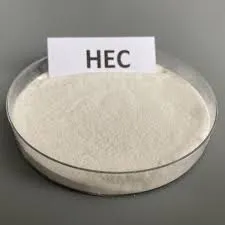
Dec . 05, 2024 08:31 Back to list
Hydroxyethyl Cellulose Manufacturers and Suppliers for Your Industrial Needs
Hydroxyethyl Cellulose Suppliers A Comprehensive Overview
Hydroxyethyl cellulose (HEC) is a water-soluble polymer derived from cellulose, which has become a crucial ingredient across various industries, including pharmaceuticals, cosmetics, construction, and food processing. Its versatility stems from its ability to act as a thickener, stabilizer, and binder, making it invaluable in formulations where viscosity control and texture improvement are required. As global demand for HEC rises, the role of suppliers in ensuring quality and consistency is more critical than ever.
Understanding Hydroxyethyl Cellulose
Hydroxyethyl cellulose is produced by the reaction of ethylene oxide with alkali cellulose. The resulting product is a white, odorless powder that swells in water, forming a clear, highly viscous solution. HEC's unique properties include its ability to enhance the stability of emulsions, provide moisture retention, and improve the overall texture of products. Because of its non-ionic nature, it is compatible with a wide range of substances, which makes it particularly useful in formulations spanning diverse pH levels and ionic strengths.
Applications of Hydroxyethyl Cellulose
1. Pharmaceuticals HEC is used in drug formulations as a thickener and stabilizer. It enhances the rheological properties of gels and helps in controlled-release formulations, ensuring that active ingredients are released at the desired rate.
2. Cosmetics and Personal Care In the beauty industry, HEC is commonly found in products such as lotions, shampoos, and makeup. Its thickening properties provide a desirable texture, while its moisture-retaining ability improves skin hydration.
3. Construction In building materials, HEC is used as a thickening agent in adhesives, sealants, and paints. Its water-retention properties are vital in ensuring that products maintain optimal workability and adhesion over time.
4. Food Industry HEC serves as a food additive in various applications, including as a stabilizer in sauces and dressings. Its role extends to improving mouthfeel and texture in food products.
hydroxyethyl cellulose suppliers

Choosing the Right Supplier
Selecting the right hydroxyethyl cellulose supplier is pivotal for businesses reliant on this polymer. Here are key considerations to help in the selection process
1. Quality Assurance The supplier should comply with international quality standards and regulations, such as GMP (Good Manufacturing Practices) and ISO certifications. Testing for purity and performance can significantly impact the end product's quality.
2. Technical Support A reliable supplier usually provides technical expertise and support. This includes offering advice on formulation adjustments, compatibility, and performance optimization based on specific application needs.
3. Sustainability With an increasing focus on sustainability, suppliers that utilize environmentally friendly methods and offer bio-based or renewable HEC products can align better with eco-conscious consumers and businesses.
4. Global Reach and Reliability Evaluate the supplier's distribution capabilities to ensure timely delivery and availability of products, especially if your business operates on a global scale.
5. Innovative Solutions Suppliers that invest in research and development may offer innovative HEC derivatives or customized formulations, giving clients a competitive edge in their respective markets.
Conclusion
The role of hydroxyethyl cellulose suppliers is increasingly vital in a variety of sectors that seek to innovate while maintaining product quality and safety. As the demand for HEC continues to grow, establishing a partnership with reputable suppliers who prioritize quality, sustainability, and technical support is essential for success. By making informed choices regarding HEC sourcing, businesses not only enhance their product offerings but also contribute to higher standards within the industry. The continuous evolution of applications for HEC will likely lead to more specialized suppliers emerging, catering to the unique needs of diverse markets, and potentially creating even more opportunities for innovation in the future.
-
Versatile Hpmc Uses in Different Industries
NewsJun.19,2025
-
Redispersible Powder's Role in Enhancing Durability of Construction Products
NewsJun.19,2025
-
Hydroxyethyl Cellulose Applications Driving Green Industrial Processes
NewsJun.19,2025
-
Exploring Different Redispersible Polymer Powder
NewsJun.19,2025
-
Choosing the Right Mortar Bonding Agent
NewsJun.19,2025
-
Applications and Significance of China Hpmc in Modern Industries
NewsJun.19,2025







